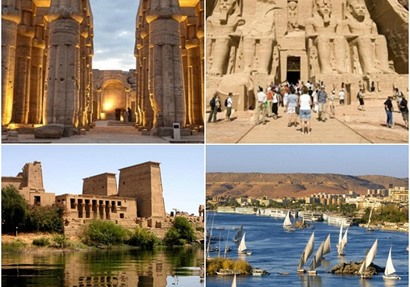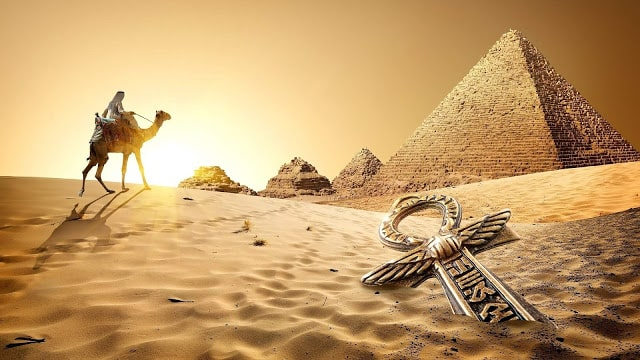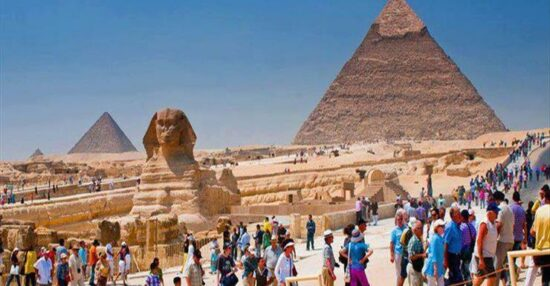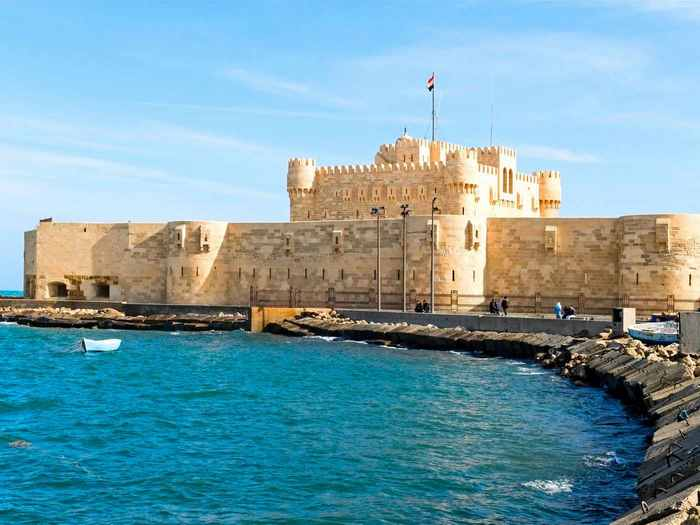The most important tourist attractions in Egypt

Tourism in Egypt is a significant industry, and the country is known for its rich history and cultural heritage. Egypt has numerous famous attractions that draw millions of tourists each year, including the Great Pyramids of Giza, the Sphinx, and the temples of Luxor and Karnak. Visitors can also explore the Red Sea coast, with its pristine beaches and world-class diving and snorkeling opportunities.
In addition to its historical and natural attractions, Egypt also has a vibrant culture and cuisine that visitors can experience. Visitors can sample traditional Egyptian dishes such as koshari (a popular street food made with rice, lentils, and pasta), ful medames (a hearty breakfast dish made with fava beans), and kofta (spiced meatballs). They can also attend cultural events such as music and dance performances, and visit local markets to buy traditional handicrafts and souvenirs.

Egypt has a range of accommodation options for visitors, from luxury hotels to budget-friendly hostels. Visitors can also take a cruise down the Nile River to see the country’s ancient temples and monuments from a different perspective.
While tourism in Egypt has been impacted by political instability and security concerns in recent years, the government has taken steps to improve safety and security for visitors. The country has also implemented measures to promote sustainable tourism, such as protecting natural habitats and supporting local communities. Overall, Egypt remains a popular destination for tourists who are interested in history, culture, and adventure.

Certainly, here are some additional details about tourism in Egypt:
- Historical Sites: Egypt’s rich history and cultural heritage is one of its main draws for tourists. The Great Pyramids of Giza, the Sphinx, and the temples of Luxor and Karnak are some of the most famous attractions in the country. Visitors can also explore the Valley of the Kings, which is home to the tombs of Egyptian pharaohs, and the ancient city of Alexandria.
- Beaches and Water Sports: Egypt has a long coastline along the Red Sea, which is renowned for its crystal-clear waters and colorful marine life. Visitors can enjoy swimming, snorkeling, and diving in the Red Sea, and explore the coral reefs and shipwrecks that lie beneath the surface. There are also several beach resorts along the coast where visitors can relax and soak up the sun.
- Cultural Experiences: Egypt has a vibrant culture that visitors can experience through music, dance, and food. Visitors can attend music and dance performances, such as the Tanoura dance, which is a traditional Sufi dance that is performed by spinning in a circle. Egyptian cuisine is also renowned for its delicious flavors and spices, and visitors can sample traditional dishes such as ful medames (a breakfast dish made with fava beans) and koshari (a popular street food made with rice, lentils, and pasta).
- Accommodation Options: Egypt has a range of accommodation options for visitors, from luxury hotels to budget-friendly hostels. Visitors can also take a cruise down the Nile River to see the country’s ancient temples and monuments from a different perspective.
- Safety and Security: While Egypt has experienced political instability and security concerns in recent years, the government has taken steps to improve safety and security for visitors. Tourist areas are heavily policed, and security measures have been implemented at airports and other public places.
- Sustainable Tourism: Egypt has implemented measures to promote sustainable tourism, such as protecting natural habitats and supporting local communities. The country has also launched initiatives to reduce plastic waste and promote eco-friendly tourism practices.
Egypt is a popular destination for tourists who are interested in history, culture, and adventure. While challenges remain, the country has taken steps to improve safety and security for visitors and promote sustainable tourism practices.
Certainly, here are some additional details about tourism in Egypt:
- Religious Tourism: Egypt is also a destination for religious tourism, particularly for Muslims and Christians. The country has a rich Islamic heritage, and visitors can explore mosques and other Islamic landmarks such as the Al-Azhar Mosque and the Citadel of Saladin in Cairo. There are also several important Christian sites, including the Coptic Church of St. George in Cairo and the Monastery of Saint Catherine in the Sinai Peninsula.
- Adventure Tourism: Egypt offers a range of adventure tourism activities, including hiking, desert safaris, and hot air balloon rides over the Nile River and the Valley of the Kings. Visitors can also participate in water sports such as kiteboarding and windsurfing along the Red Sea coast.
- Museums: Egypt has a wealth of museums that showcase the country’s rich history and cultural heritage. The Egyptian Museum in Cairo is home to a vast collection of ancient artifacts, including the treasures of Tutankhamun. Other museums in the country include the Nubian Museum in Aswan, which highlights the history and culture of the Nubian people, and the Alexandria National Museum, which showcases the history of Alexandria and the surrounding region.
- Festivals and Events: Egypt hosts several festivals and events throughout the year, including the Cairo International Film Festival, the Luxor African Film Festival, and the Abu Simbel Sun Festival, which celebrates the bi-annual alignment of the sun with the temple of Ramses II in Abu Simbel. Visitors can also participate in religious and cultural celebrations such as Eid al-Fitr and Ramadan.
Overall, Egypt has a lot to offer visitors who are interested in history, culture, adventure, and spirituality. Despite challenges, the country has taken steps to improve safety and security for visitors and promote sustainable tourism practices.

Certainly, here are some additional details about tourism in Egypt:
- Medical Tourism: In recent years, Egypt has become a popular destination for medical tourism, particularly for cosmetic surgery and dental procedures. The country has a number of well-equipped hospitals and clinics, and medical procedures are often significantly cheaper than in other countries.
- Shopping: Egypt is also known for its markets and bazaars, where visitors can buy traditional handicrafts, textiles, spices, and souvenirs. Some of the most famous markets include the Khan el-Khalili market in Cairo and the Luxor market.
- Language: Arabic is the official language of Egypt, but English is widely spoken in tourist areas. Visitors may also encounter other languages, such as French and German, depending on the region.
- Climate: Egypt has a hot and dry climate, with high temperatures throughout the year. The best time to visit is during the winter months (November to February), when temperatures are milder and more comfortable for outdoor activities.
- Transportation: Egypt has a range of transportation options for visitors, including taxis, buses, and trains. Visitors can also hire a private driver or join a guided tour to explore the country’s attractions. Domestic flights are also available for travel between cities.
Egypt remains a popular destination for tourists who are interested in history, culture, adventure, and spirituality. The country has taken steps to improve safety and security for visitors and promote sustainable tourism practices, and offers a wide range of attractions and experiences that cater to different interests and budgets.
Certainly, here are some additional details about tourism in Egypt:
- Visa Requirements: Visitors to Egypt may need a visa to enter the country, depending on their nationality. Some nationalities can obtain a visa on arrival at the airport, while others need to apply for a visa in advance. It’s important to check the visa requirements before planning a trip to Egypt.
- Currency: The official currency of Egypt is the Egyptian pound (EGP). Visitors can exchange their currency at banks, exchange offices, and hotels. ATMs are also widely available in tourist areas.
- Etiquette: Visitors to Egypt should be mindful of cultural norms and etiquette. For example, it’s important to dress modestly when visiting mosques and other religious sites, and to remove shoes before entering some buildings. Visitors should also be prepared for the possibility of being approached by vendors and touts in tourist areas.
- Health and Safety: Visitors to Egypt should take precautions to protect their health and safety. It’s important to drink bottled water and avoid tap water, as well as to avoid eating street food that may be unsafe. Visitors should also be vigilant in crowded areas and tourist sites, and be aware of pickpocketing and other petty crimes.
- Sustainability: Egypt has made efforts to promote sustainable tourism practices, such as reducing plastic waste and supporting local communities. Visitors can also support sustainability by choosing eco-friendly accommodations and activities, and by respecting local customs and traditions.
Overall, Egypt continues to attract visitors from around the world who are interested in its rich history, culture, and natural beauty. The country offers a wide range of attractions and experiences that cater to different interests and budgets, and has taken steps to improve safety and security for visitors and promote sustainable tourism practices.
Certainly, here are some additional details about tourism in Egypt:
- Accessibility: Egypt has made efforts to improve accessibility for travelers with disabilities, with some hotels and tourist sites offering wheelchair access and other accommodations. However, accessibility may still be a challenge in some areas, and visitors with disabilities should research their options and plan accordingly.
- Photography: Egypt is a photographer’s paradise, with many opportunities to capture stunning images of ancient monuments, landscapes, and people. However, visitors should be mindful of photography restrictions in some areas, such as military sites and some museums. It’s also important to respect the privacy of local people and seek permission before taking their photo.
- Nightlife: Egypt’s major cities, such as Cairo and Alexandria, offer a vibrant nightlife scene with a range of bars, restaurants, and clubs. Visitors can enjoy live music, dancing, and socializing in a variety of settings, from rooftop bars with views of the Nile River to underground nightclubs.
- Sports: In addition to water sports such as snorkeling and diving, Egypt offers opportunities for other sports such as golf, tennis, and horseback riding. The country also hosts several international sports events, such as the Egypt Open tennis tournament and the Pharaohs Rally off-road race.
- Volunteer Opportunities: Visitors to Egypt can also participate in volunteer opportunities to support local communities and conservation efforts. Some organizations offer volunteer programs focused on education, healthcare, and environmental conservation, among other areas.
Egypt remains a popular destination for tourists who are interested in history, culture, adventure, and spirituality. The country offers a wide range of attractions and experiences that cater to different interests and budgets, and has taken steps to improve safety and security for visitors and promote sustainable tourism practices.

Certainly, here are some additional details about tourism in Egypt:
- Festivals and Celebrations: Egypt is home to a range of festivals and celebrations throughout the year, including religious celebrations such as Ramadan and Eid al-Fitr, as well as cultural events such as the Cairo International Book Fair and the Aswan International Women’s Film Festival. Visitors can also participate in traditional celebrations such as the Moulid al-Nabi, which honors the birth of the Prophet Muhammad.
- Film Industry: Egypt has a vibrant film industry that dates back to the early 20th century. Egyptian cinema has produced several internationally acclaimed films and has a large following in the Arab world. Visitors can explore the history of Egyptian cinema at the Cairo Film Festival or visit the film studios in Cairo.
- Transportation: Egypt has a range of transportation options for visitors, including taxis, buses, and trains. Visitors can also hire a private driver or join a guided tour to explore the country’s attractions. Domestic flights are also available for travel between cities.
- Language: Arabic is the official language of Egypt, but English is widely spoken in tourist areas. Visitors may also encounter other languages, such as French and German, depending on the region.
- Cuisine: Egyptian cuisine is renowned for its delicious flavors and spices. Visitors can sample traditional dishes such as koshari (a popular street food made with rice, lentils, and pasta), ful medames (a hearty breakfast dish made with fava beans), and kofta (spiced meatballs). Egyptian cuisine also includes a variety of vegetarian and seafood dishes.
Egypt remains a popular destination for tourists from around the world who are interested in history, culture, adventure, and spirituality. The country offers a wide range of attractions and experiences that cater to different interests and budgets, and has taken steps to improve safety and security for visitors and promote sustainable tourism practices.
Certainly, here are some additional details about tourism in Egypt:
- Music and Dance: Egypt has a rich musical heritage, with a variety of traditional and modern music styles. Visitors can enjoy live performances of traditional music, such as the popular folkloric music of Upper Egypt, or attend concerts by contemporary Egyptian musicians. Egyptian dance is also a popular attraction, with styles ranging from the whirling dervish dance to the energetic Saidi dance.
- Wildlife and Nature: Egypt has a range of natural attractions, from the Red Sea coastline to the Sahara Desert. Visitors can explore the country’s wildlife and natural beauty by taking a camel trek through the desert, going birdwatching in the Nile Delta, or taking a safari in the Wadi El Gemal National Park.
- Religious Tolerance: Egypt is known for its religious tolerance and coexistence, with the country being home to a significant Muslim and Christian population. Visitors can explore the country’s religious landmarks and sites, such as the Al-Azhar Mosque and the Coptic Church of St. George in Cairo.
- Art and Museums: Egypt has a rich art and museum scene, with a variety of museums and galleries showcasing the country’s cultural heritage. The Egyptian Museum in Cairo is home to a vast collection of ancient artifacts, including the treasures of Tutankhamun. Other museums in the country include the Alexandria National Museum and the Nubian Museum in Aswan.
- Architecture: Egypt has a rich architectural heritage, with a variety of styles ranging from ancient Egyptian temples and pyramids to Islamic architecture and modern skyscrapers. Visitors can explore the country’s architectural landmarks, such as the Great Pyramids of Giza, the Al-Azhar Mosque, and the modern Cairo Tower.
Egypt offers a diverse range of attractions and experiences that cater to different interests and budgets. The country has taken steps to improve safety and security for visitors and promote sustainable tourism practices, and continues to be a popular destination for tourists from around the world.
Certainly, here are some additional details about tourism in Egypt:
- Education: Egypt has a long history of education and scholarship, with several universities and research institutions located throughout the country. Visitors can attend lectures and seminars at universities such as Cairo University or the American University in Cairo, or participate in cultural exchange programs with local schools and institutions.
- Architecture: Egypt has a rich architectural heritage, with a variety of styles ranging from ancient Egyptian temples and pyramids to Islamic architecture and modern skyscrapers. Visitors can explore the country’s architectural landmarks, such as the Great Pyramids of Giza, the Al-Azhar Mosque, and the modern Cairo Tower.
- Water Activities: In addition to water sports such as snorkeling and diving, Egypt offers a variety of other water activities such as boat cruises along the Nile River or the Red Sea. Visitors can also explore the country’s waterfalls, such as the Wadi El Rayan waterfalls or the Ain Sira waterfalls.
- Shopping: Egypt is known for its markets and bazaars, where visitors can buy traditional handicrafts, textiles, spices, and souvenirs. Some of the most famous markets include the Khan el-Khalili market in Cairo and the Luxor market.
- Volunteering: Visitors to Egypt can participate in volunteer programs to support local communities and conservation efforts. Some organizations offer volunteer programs focused on education, healthcare, and environmental conservation, among other areas.
Egypt continues to be a popular destination for tourists from around the world who are interested in history, culture, adventure, and spirituality. The country offers a diverse range of attractions and experiences that cater to different interests and budgets, and has taken steps to improve safety and security for visitors and promote sustainable tourism practices.

Certainly, here are some additional details about tourism in Egypt:
- Beaches: Egypt has a long coastline along the Mediterranean Sea and the Red Sea, with a variety of beaches that offer opportunities for swimming, sunbathing, and water sports. Some of the most popular beach destinations in Egypt include Sharm El-Sheikh, Hurghada, and Marsa Alam.
- Festivals and Celebrations: Egypt hosts a range of festivals and celebrations throughout the year, including religious celebrations such as Ramadan and Eid al-Fitr, as well as cultural events such as the Cairo International Film Festival and the Luxor African Film Festival. Visitors can also participate in traditional celebrations such as the Moulid al-Nabi, which honors the birth of the Prophet Muhammad.
- Cultural Experiences: Egypt offers a range of cultural experiences for visitors, including traditional music and dance performances, cooking classes, and handicraft workshops. Visitors can also participate in traditional customs and rituals, such as drinking tea with local Bedouin tribes or celebrating Ramadan with local families.
- Wellness and Spa: Egypt offers a variety of wellness and spa experiences, from traditional hammams and massages to modern spa treatments and yoga classes. Visitors can relax and rejuvenate in a variety of settings, from luxury resorts to traditional guesthouses.
- Film Industry: Egypt has a vibrant film industry that dates back to the early 20th century. Egyptian cinema has produced several internationally acclaimed films and has a large following in the Arab world. Visitors can explore the history of Egyptian cinema at the Cairo Film Festival or visit the film studios in Cairo.
Egypt remains a popular destination for tourists from around the world who are interested in history, culture, adventure, and spirituality. The country offers a diverse range of attractions and experiences that cater to different interests and budgets, and has taken steps to improve safety and security for visitors and promote sustainable tourism practices.
Certainly, here are some additional details about tourism in Egypt:
- Sports: In addition to water sports such as snorkeling and diving, Egypt offers opportunities for other sports such as golf, tennis, and horseback riding. The country also hosts several international sports events, such as the Egypt Open tennis tournament and the Pharaohs Rally off-road race.
- Transportation: Egypt has a range of transportation options for visitors, including taxis, buses, and trains. Visitors can also hire a private driver or join a guided tour to explore the country’s attractions. Domestic flights are also available for travel between cities.
- Language: Arabic is the official language of Egypt, but English is widely spoken in tourist areas. Visitors may also encounter other languages, such as French and German, depending on the region.
- Cuisine: Egyptian cuisine is renowned for its delicious flavors and spices. Visitors can sample traditional dishes such as koshari (a popular street food made with rice, lentils, and pasta), ful medames (a hearty breakfast dish made with fava beans), and kofta (spiced meatballs). Egyptian cuisine also includes a variety of vegetarian and seafood dishes.
- Accessibility: Egypt has made efforts to improve accessibility for travelers with disabilities, with some hotels and tourist sites offering wheelchair access and other accommodations. However, accessibility may still be a challenge in some areas, and visitors with disabilities should research their options and plan accordingly.
Egypt is a fascinating destination that offers a wealth of attractions and experiences for visitors. With its rich history, diverse culture, natural beauty, and modern amenities, Egypt has something to offer every type of traveler. The country has taken steps to improve safety and security for visitors and promote sustainable tourism practices, making it a popular and rewarding destination for tourists from around the world.

Certainly, here are some additional details about tourism in Egypt:
- Safety and Security: Egypt has taken significant steps to improve safety and security for visitors, particularly in tourist areas. Tourists should exercise caution, follow local laws and customs, and be aware of their surroundings, especially in crowded areas or public transportation.
- Currency: The official currency of Egypt is the Egyptian pound (EGP), and visitors can exchange currency at banks, hotels, and exchange offices located throughout the country. Credit cards are also widely accepted in tourist areas.
- Climate: Egypt has a desert climate, with hot temperatures and little rainfall. The best time to visit is during the cooler months from November to February, although the Red Sea resorts remain popular year-round.
- Art and Museums: Egypt has a rich art and museum scene, with a variety of museums and galleries showcasing the country’s cultural heritage. The Egyptian Museum in Cairo is home to a vast collection of ancient artifacts, including the treasures of Tutankhamun. Other museums in the country include the Alexandria National Museum and the Nubian Museum in Aswan.
- Religious Tolerance: Egypt is known for its religious tolerance and coexistence, with the country being home to a significant Muslim and Christian population. Visitors can explore the country’s religious landmarks and sites, such as the Al-Azhar Mosque and the Coptic Church of St. George in Cairo.
Egypt remains a popular and fascinating destination for tourists from around the world. With its rich history, diverse culture, natural beauty, and modern amenities, Egypt offers a wealth of attractions and experiences for visitors. The country has taken steps to improve safety and security for tourists and promote sustainable tourism practices, making it a rewarding and memorable destination for travelers.



